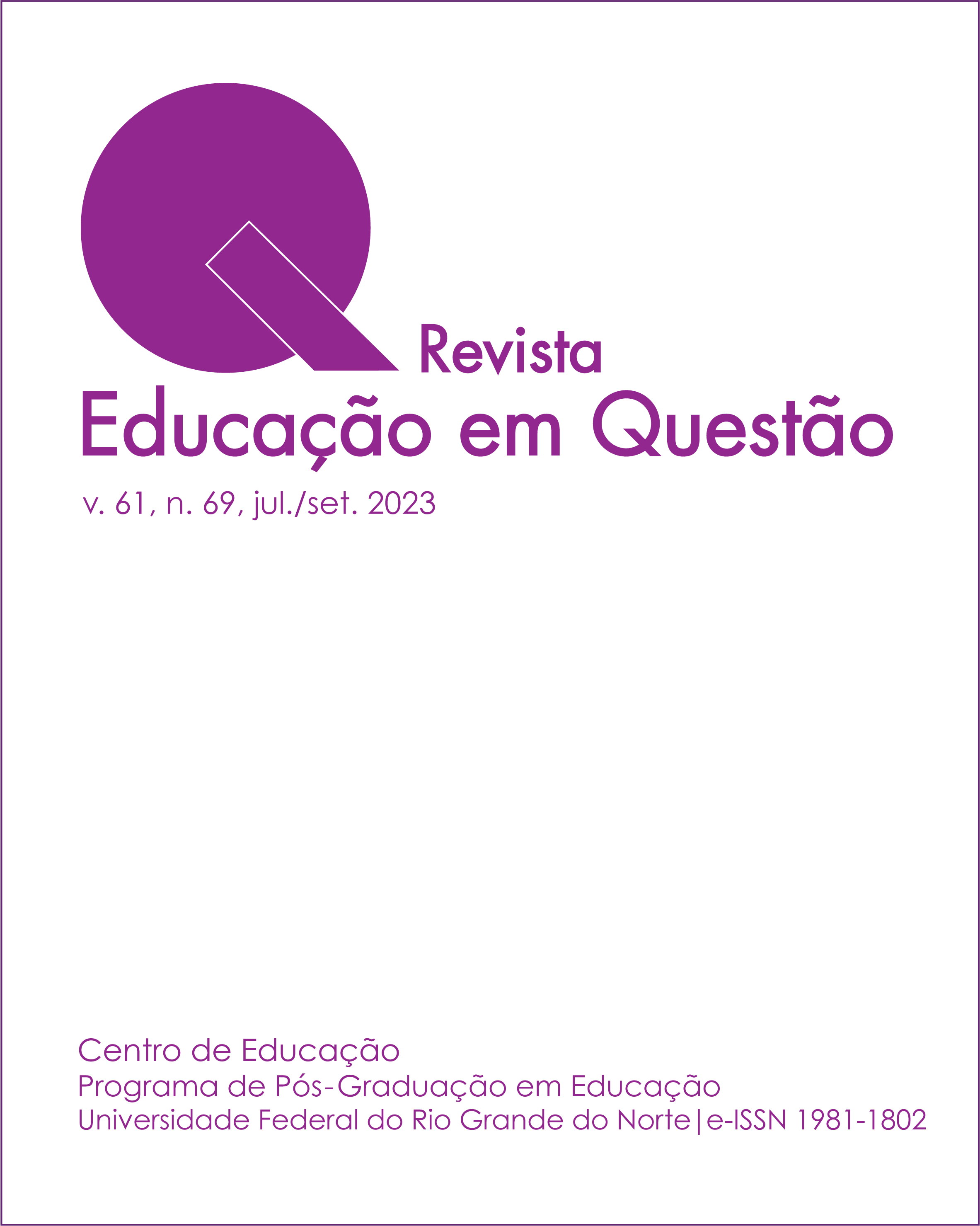Moral embodiments of the future in school
thoughts about an intersubjective moral background
DOI:
https://doi.org/10.21680/1981-1802.2023v61n69ID32438Keywords:
Intersubjective normative background, School discipline/indiscipline, School moralities, Projects and projections of futureAbstract
The article discusses students' conceptions of the future projected by themselves, or about them by other school actors and their links to certain moralities in the school environment. To achieve this, it undertakes reflections that allow us to understand the ways in which the future is embodied in the daily life of school institutions. The methodology used had an ethnography and was complemented by a series of semi-structured interviews. In the school analyzed, an intersubjective normative background was identified, shared, to a greater or lesser extent, by everyone. This background was articulated and crossed by several other moralities and built a certain symbolic horizon. We identified four ideal types that provided a framework of intelligibility for the ways in which the future was activated in the daily relationships. These will guide reflection, but they do not function as students' destinies or fixed positionings in this social space.
Downloads
References
Referências
ANA CARLA . Entrevista. São Carlos (São Paulo), 22 maio 2018.
BHABHA, Homi. O local da cultura. Tradução: Myriam Ávila, Eliana Lourenço de Lima Reis e Gláucia Renate Gonçalves. Belo Horizonte: Editora da UFMG, 1998.
BOMFIM, Natanael Reis; GARRIDO, Walter Von Czékus. Representações sociais sobre o futuro de jovens periféricos e suas contribuições às práticas socioeducativas. Revista Educação em Questão, Natal, v. 60, n. 63, p. 1-24, jan./mar. 2022. Disponível em: https://periodicos.ufrn.br/educacaoemquestao/article/view/27188. Acesso em: 12 maio. 2022.
BOURDIEU, Pierre. Razões práticas: sobre a teoria da ação. Tradução: Mariza Corrêa. Campinas: Papirus, 1996.
DELEUZE, Gilles; GUATTARI, Félix. Mil platôs: capitalismo e esquizofrenia. Tradução: Peter Pál Pelbart e Janice Caiafa. São Paulo: Editora 34, 1997 (v 5).
DURANTI, Alessandro. Husserl, intersubjectivity and anthropology. Anthropological Theory, v. 10, n. 16-35, p. 1-20, 2010.
FELTRAN, Gabriel de Santis. Fronteiras de tensão: política e violência nas periferias de São Paulo. São Paulo: Editora UNESP/CEM, 2011.
FRIEDRICH, Paul. Ironic Irony. In: FERNANDEZ, James W.; HUBER, Mary Taylor (org.). Irony in action. Chicago and London: The University of Chicago Press, 2001.
GEERTZ, Clifford. A interpretação das culturas. Tradução: Fanny Wrobel. Rio de Janeiro: LTC, 2008.
GOLDMAN, Márcio. Os tambores dos mortos e os tambores dos vivos. Etnografia, antropologia e política em Ilhéus, Bahia. Revista de Antropologia, São Paulo, v. 46, n. 2, p. 445-476, 2003.
HANEKAWA. Entrevista. São Carlos (São Paulo), 22 maio 2018.
HUSSERL, Edmund. Lições para uma fenomenologia da consciência interna do tempo. Tradução: Pedro M. S. Alves. Lisboa: Imprensa Nacional/Casa da Moeda, 1994.
MARCELA. Entrevista. São Carlos (São Paulo), 22 maio 2018.
MARX, Karl; ENGELS, Friedrich. Manifesto do Partido Comunista. Tradução: José Barata-Moura e Francisco Melo. Lisboa: Editorial Avante, 1997.
MONTEIRO, Leonardo Henrique Brandão. (In)disciplina e visibilidade: considerações sobre ambiguidades e tensões no ambiente escolar. Revista Teias, Rio de Janeiro, v. 23, n. 68, p. 176-192, 2022.
NIETZSCHE, Friedrich. A genealogia da moral. Tradução: Paulo César Moura. São Paulo: Companhia das Letras, 1998.
PEREIRA JÚNIOR, Alfredo. A percepção do tempo em Husserl. Trans/Form/Ação, São Paulo, v. 13, p. 73-83, 1990.
QUIRÓS, Julieta. Etnografiar mundos vívidos. Desafío del trabajo de campo, escritura y enseñanza en antropología. Publicar, n. 17, p. 47-65, 2014.
RITA. Entrevista. São Carlos (São Paulo), 22 maio 2018.
RODRIGUES, Luciana Azevedo. A (in)disciplina em revista: um estudo sobre indústria cultural. 2007. Tese (Doutorado em Educação) – Programa de Pós-Graduação em Educação, Universidade Federal de São Carlos, 2007.
TESSARO, Mônica; BERNARDI, Lucí Teresinha Marchiori dos Santos. O futuro pode ter muitos nomes: significando o foreground. Práxis Educacional, Vitória da Conquista, v. 15, n. 36, p. 415-432, 2019.
VIOLETA. Entrevista. São Carlos (São Paulo), 28 maio 2018.
WEBER, Max. A “objetividade” do conhecimento nas ciências sociais. Tradução: Gabriel Cohn. São Paulo: Ática, 2006.
WEBER, Max. A ética protestante e o espírito do capitalismo. Tradução: Irene de Q. F. Szmrecsányi e Tamás J. M. K. Szmrecsányi. São Paulo: Pioneira, 1999.
WIDLOK, Thomas. Norm and spontaneity: elicitation with moral dilemma scenarios. In: HEINTZ, Monica. The Anthropology of Moralities. United Kingdom: Berghahn Books, 2009.
ZIGON, Jarrett. Moral breakdown and the ethical demand. Anthropological Theory, Bern, v. 7, n. 2, p. 131-150, 2007.
ZIGON, Jarrett. Attunement and fidelity: Two Ontological Conditions for Morally Being-in-the-World. Ethos, v. 42, n. 1, p. 16-30, 2014.
Downloads
Published
How to Cite
Issue
Section
License
Copyright (c) 2023 Journal Education in Question

This work is licensed under a Creative Commons Attribution-NonCommercial-ShareAlike 4.0 International License.
The Journal Education in Question shall retain the copyright in all articles that it publishes.
The authors and co-authors of articles and book reviews, published in the Journal Education in Question, shall wait for at least 1 (one) year before they are allowed to submit new works for publication.






